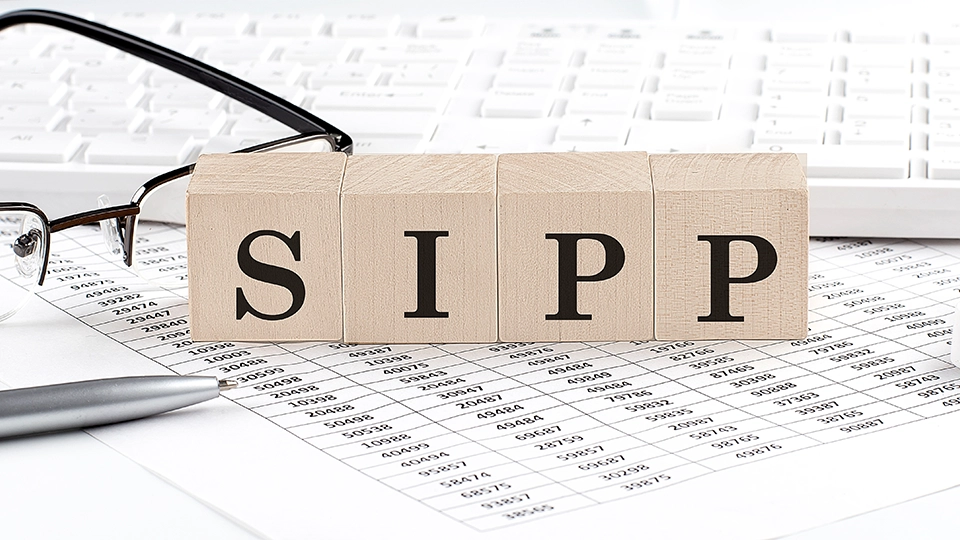SIPPs

The more control we have in a given situation, the more we can affect the outcome.
Our pension plays a vital role in creating financial stability when we stop working. However, the amount of control we have over our retirement savings and where they are invested is often limited.
Instead, the pension provider makes these decisions, which for some, is perfectly fine. But for others, having more control over where their pension pot is invested and how it grows.
And for those who want to take a more hands-on approach with their pension savings, a self-invested personal pension (SIPP) could be the answer.
This guide provides a definitive look at SIPPs. We explore their benefits, investment options, tax treatment and more.
SIPPs explained
A self-invested personal pension, or SIPP for short, is a type of defined contribution pension.
What sets a SIPP apart from other types of pensions is the control and flexibility they offer.
Instead of the pension provider deciding where your pension fund is invested, the investment decisions are made by the SIPP holder. This means you have more flexibility and a wider range of investment options.
And if you don't want to manage your own investments, you can hire a financial adviser to manage them. Bear in mind this will come at an additional cost, so you should factor this into your retirement plans.
What are the benefits of a SIPP?
SIPPs offer several benefits that make them an attractive option for retirement planning. Some of these include:
Control
With a traditional pension scheme, the investment decisions are made for you by the pension provider. A SIPP, on the other hand, takes a much more hands-on approach.
Investors have far more control over where their money is invested and how it is managed.
Flexibility
SIPP holders have a much broader range of investment choices. This allows them to invest in a way that aligns with their risk tolerance and retirement goals.
The wider investment options also make it easier for investors to diversify their pension portfolio.
Tax advantages
A SIPP is what is known as a 'tax wrapper' pension. These are tax breaks that 'wrap' around your pension savings and investments, offering some protection from tax.
Pension contributions to SIPPs benefit from tax relief for UK residents. With pension tax relief, some of the money you add that would otherwise have gone to the government as tax goes into your pension fund.
With a SIPP, your investments also grow free from Income Tax and Capital Gains tax.
If you are no longer a UK resident, you can still set up a SIPP and transfer your UK pension, but you will not benefit from tax relief. Generally speaking, you cannot continue contributing to your UK SIPP if you no longer live in the UK or are no longer a UK tax resident.
However, each SIPP has slightly different rules. You need to consult your existing SIPP provider to establish whether you can continue contributing to your SIPP once you have left the UK. If possible, ensure you are aware of the rules before moving abroad.
Combining multiple pensions
A SIPP allows you to consolidate multiple pensions into one pot. With all of your pensions under one roof, managing them and tracking their performance can be easier.
SIPP investment options
The ability to invest in a broad range of assets is one of the defining features of a SIPP and one of its main benefits.
SIPPs offer a much wider choice of investment options than other pension types, giving investors great control over their money. Some of these investment options include:
- Company shares
- Investment trusts
- Government and corporate bonds
- A range of funds, including Exchange Traded Funds (ETFs)
- Commercial property investments
- Offshore funds
- Real estate investment trusts (REITs)
Do SIPPs benefit from pension tax relief?
Like personal and workplace pensions, SIPPs benefit from UK tax relief on contributions. This means the government tops up any money you pay into a SIPP, making them a tax-efficient way to save for retirement.
The rate of tax relief you get depends on your UK Income Tax bracket:
- Basic rate taxpayers - 20%
- Higher rate taxpayers - 40%
- Additional rate taxpayers - 45%
While you can have as many SIPPs as you like, there are limits to how much you can contribute in a given tax year and still get tax relief.
Annual allowance
Your annual allowance is the amount you can add to your pension savings each tax year (6 April to 5 April) before you pay tax.
The current annual allowance is £60,000, which applies to all your pension pots. It may be possible to carry over any unused allowances from the previous three tax years.
Going over your annual allowance could mean you face an annual allowance charge.
Lifetime allowance
The lifetime allowance is the maximum pension benefit you can build up over your lifetime before paying tax.
The current lifetime allowance (LTA) for the 2023/24 tax year is £1,073,100. Those who took their pension before 6 April 2023 would have paid an LTA charge for going over their allowance. But as of 6 April 2023, there is no longer an LTA charge.
And while the LTA is currently set at £1,073,100, it will be fully abolished from the 2024/25 tax year, meaning there will be no cap on how much pension benefit you can build up over your lifetime.

Financial planning with Holborn?
Holborn can help you make way more money than you have now.
Accessing your SIPP
You can start drawing a pension income from the at of 55. Be aware that the minimum pension age is set to rise to 57 from April 2028.
You can take money from your pension pot in several ways. Some of the most common options are:
- Buy an annuity - these provide an income for life that is treated as taxable income. You can also typically take up to 25% of your pension pot as a tax-free lump sum.
- Take a flexible retirement income - also known as a pension drawdown. This option allows you to take up to 25% as a tax-free lump sum if you are a UK tax resident and the rest as regular taxable income.
- Take multiple lump sums - you can take multiple lump sums with 25% of each being tax-free if you are a UK tax resident. For example, if you took £3,000 per month, the first £750 (25%) would be tax-free.
- Take your pension in one go - if you take all of your pension pot in one go, the first 25% will usually be tax-free, while the rest will be treated as taxable income.
You can also combine these options to access your pension in a way that meets your needs.
Can you transfer other pensions into a SIPP?
You can hold a SIPP alongside existing workplace pensions or other pension schemes.
The other option is to transfer your existing pensions into one pot. Having all of your retirement savings in one place can help you keep track of your savings and make them easier to manage.
Most UK pensions can be transferred into a SIPP, including:
- Defined contribution schemes
- Defined benefit schemes
- Stakeholder pensions
A defined benefit pension scheme (DB pension) provides a guaranteed income in retirement. Transferring this type of pension to a SIPP is typically not recommended. However, there are situations where transferring a DB pension can be beneficial.
Speaking to an experienced pensions expert can help you better understand whether transferring your DB pension is the right strategy based on your personal needs and situation.
In the UK, anyone under 75 can open a SIPP. And while there are no age limits for transferring a pension, there are rules in place if you want to transfer a direct benefit pension.
By law, you must seek advice from an FCA-regulated financial adviser if the value of your DB pension you wish to transfer is greater than £30,000. The adviser must have permission for the activity of 'advising on pension transfers and pension opt-outs'.
Is a SIPP the right option for you?
While SIPPs provide greater control and additional investment flexibility, they may not be the right choice for everyone.
Typically, a SIPP is best suited for those who have the knowledge to pick their own investments and the time to manage and monitor investment performance.
That is because investments in a SIPP are like any other investment. The value and any income from them may fall and rise and is not guaranteed.
However, if you want the benefits of a SIPP but you don't want to manage it yourself, speak to a regulated financial adviser.
Pension planning with Holborn Assets
Pensions play a vital role, providing a reliable source of income in retirement.
For those looking for a pension product that gives them greater flexibility and control over their retirement savings, a SIPP could be a good option.
If you want to know if you could benefit from a SIPP or would like one professionally managed, we can help.
At Holborn Assets, we provide expert, independent advice and wealth management solutions to a global client base.
We do not take a one size fits all approach or provide off-the-shelf financial advice. Instead, our financial advice is tailored to your individual circumstances, needs and goals.
Start planning for a more secure financial future today with Holborn Assets. Book a free, no-obligation meeting today and learn how we can help you maximise your pension savings.

